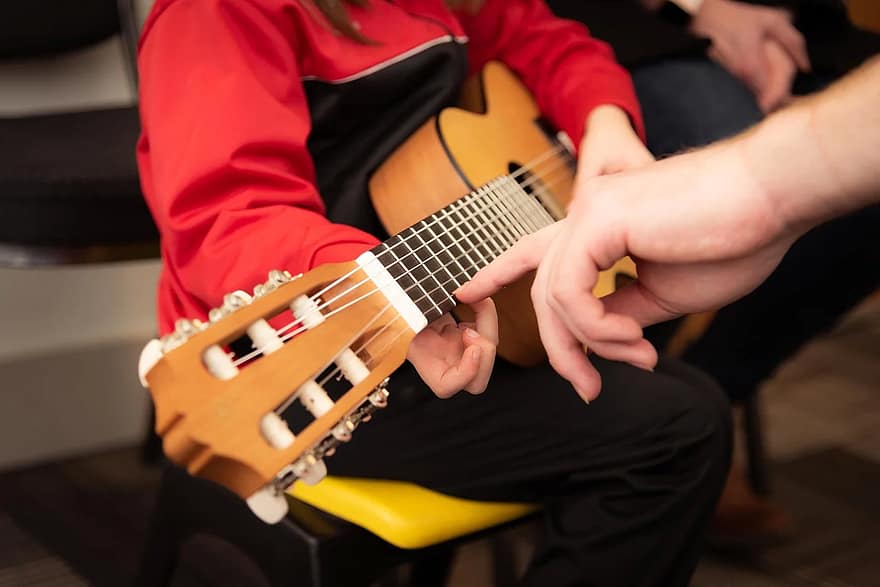Practice – what can parents do to help?

Paul Harris offers some thoughts for parents to help their children get the most out of practice.
One of the benefits of lockdown is that many young learners have more time to spend with their music. More time to practise. And, of course, many parents are home more to help. So, how best to help? Is it an advantage to be ‘musical’ and maybe play an instrument? What if you don’t consider yourself musical (actually everyone is musical!) or play an instrument or sing? In fact, these things really don’t matter. So, what can you do to help?
First of all, let’s think of practice as a place to go – not as a chore.
And it’s a very pleasant place, too, where learners go to explore, to experiment, to think and yes, to have fun. Much in the way many do when they play computer games. It’s a place where there should be no pressure and progress can be allowed to come at a natural pace.
What do you need to consider?
Here are four important thoughts for you to consider:
- You can’t give too much encouragement and (appropriate) praise.
- Think about good times to practise, but without specifying how much time.
- Don’t try to teach! (Even if you do know better.)
- Never make a child feel guilty – they resent it.
Now, what about the young learners themselves? What thoughts are driving their decision making about whether they want to do some practice? Young people:
- are interested in NOW
- need to enjoy the actual process
- need to understand why they are doing it
- like to feel in control.
The actual process needs to be:
- imaginative, fun and exciting (to some degree) … and
- provide lots of comprehensible ‘feel good’ rewards.
The really useful part you can play in this is in helping to set practice sessions up so that they reflect these considerations.
And you can do this very easily!
What you can do
First, we need to make a distinction between more elementary pupils and those who are more advanced. The more elementary will benefit from a lot of guidance from you as to the shape, structure and clear goals of the practice session. So, for each session, come to a clear decision over:
- Exactly what your child is going to do
…and afterwards…
- How did he/she get on.
What is to be done needs to be very clear. Often pupils are set a little too much to do, and don’t really know how to break down the ‘list’ into doable chucks that fit into a practice session. And sometimes that ‘list’ is a little vague. This is where you come in – you can really help to rationalise what is to be done.
In preparation you might like to have a look at the ‘list’ of what is to be done. Make your own list of any ‘ingredients’ you’re not too sure about and discuss them with you child. Does he/she understand them? If there are any aspects your child (or you) don’t get, you might even like to ask the teacher. Most teachers will be delighted that you’re taking the interest or that their pupil really want a little more explanation!
Ingredients will come in three varieties:
- Technical: all concerned with how you play or sing, how you operate the instrument (whether that’s an actual instrument or the voice). Included in technical aspects are for example: posture, the shape of the hand, using the correct fingers for notes to ensure fluidity and continuity, bow direction, clean tonguing; and singing or playing in tune.
- Musical: putting character into the music; following dynamic markings (loud or quiet) to give variety, colour and interest to the music; finding the right speed (tempo) to bring the music to life most effectively. ‘Phrasing’ the music (like speaking in phrases) which gives clarity, shape and ‘meaning’.
- Theoretical: understanding what key the piece or song is in; the notes that make up the key; what all the markings and Italian terms mean.
Once all is understood you can set up the practice session a little like this:
In today’s session you’re going to:
- work out what key your piece is in and then play the scale carefully
- say the names of the notes and then
- play it again slowly, thinking about the name of the next note before you play it
- then look for a short passage that contains some D major patterns similar to the scale (there are bound to be some!)
- having found one, identify and explore the particular technical or musical ingredients in the passage (for example: the correct fingering, slurs, staccato, dynamic levels, character)
- play the passage without stumbles and including all the marked ingredients that you have just explored
- work at another passage in the same way
Not too much really – and maybe you might even encourage two practice sessions a day!
Of course, this is just a flavour of how it might go, and dependent on the particular piece or song and its particular ingredients. But this is the approach.
A really important question
Having carried out those activities, you can now ask how did you get on? With luck, and because the plan was not too ambitious and was done carefully, there is a real feeling of accomplishment. “I did all those things: I knew what I was doing and why. I was in control!”
That last thought is so important. If we are in control then we feel comfortable, and the prospect of the next practice becomes much more positive and not daunting. Not something to feel uncomfortable about. In fact, it’s something to look forward to doing! The practice was full of a short, understandable activities with clear outcomes, all of which could be mastered – a little like going up some levels in a computer game. It met both of the points made earlier: the session was imaginative, fun and exciting (to some degree!) and it provided lots of comprehensible ‘feel good’ rewards (through carrying out each activity and being aware of the progress made).
And equally if things didn’t go so well, we are still in control of that to. Here’s an important follow-up question: is there anything we need to ask your teacher at the next lesson? Anything you couldn’t quite manage? This puts any slips or problems into a very practical and objective place. We’re still in control.
For the more advanced
Our more advanced learners (particularly if they happen to be passing through the teen years) probably won’t need such detail in the support you can give (although if they do, then do give it). If they are happy to communicate (some, of course, simply prefer to transmit monosyllabically) you can certainly show interest in what they are playing and maybe encourage them to watch and listen to performances of similar music online, which may result in raising interesting points of discussion. If they will permit you to listen to their endeavours (be it a piece, part of a piece, a scale or even a technical exercise) then listen with enthusiasm. Don’t be tempted to teach unless that kind of help is explicitly asked for.
In both the more elementary and the more advanced practice sessions, hopefully progress occurred – they went up levels – and that provides a great boost, the ‘feel good’ factor, which fuels the energy to go on to the next practice. And you will have played an important part in making that happen.
This article first appeared on ABRSM.






